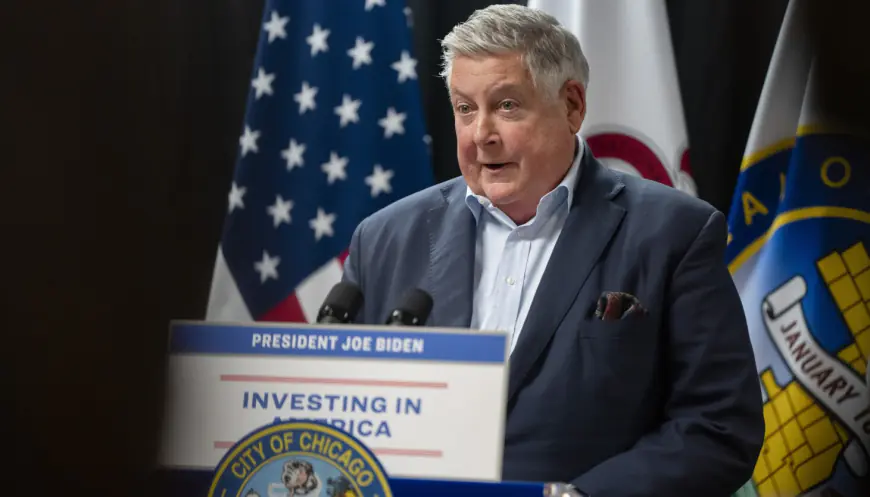RTA seeks expanded authority over CTA, Metra, Pace as solution to transit 'fiscal cliff'
Some lawmakers want to consolidate the Chicago area's four public transit agencies this year in exchange for more state money to steer the agencies away from an impending "fiscal cliff."In 2026, the Chicago Transit Authority, Metra and Pace face a combined $770 million yearly deficit and potentially a 40% reduction in bus and rail service.The Regional Transit Authority, which has limited oversight of the other three agencies, is offering a middle-road approach.RTA Chairman Kirk Dillard is asking state lawmakers to grant the RTA substantially more authority to govern fares, service and investments in major projects.According to the plan, which Dillard expects to lay out Wednesday afternoon at the City Club of Chicago, the RTA would allow the CTA, Pace and Metra to maintain control over their day-to-day operations.The RTA would gain control over the agencies' budgets, requiring quarterly reports on service levels "to ensure it is meeting the standards that have been set," Dillard says in his prepared remarks. If the RTA finds an agency is not meeting standards, it would require improvement before granting funds.According to the plan, the RTA would raise fares by 10% to increase funding by $50 million. The RTA says it can save $50 million annually by cutting redundant administrative jobs.The RTA is still seeking an additional $1.5 billion in state money to increase service frequency to the point that customers would not have to check for arrival times before leaving the door."If we are provided the necessary funding and authority, the RTA will lead — in collaboration with CTA, Metra, and Pace — a transformation of the system that fundamentally improves how we move, how we connect and how we live," Dillard says in his prepared remarks.The RTA's plan addresses public safety, a concern as transit crime rose during the pandemic, by increasing service frequency and partnering with local governments to heighten the presence of officers and social services on the system.The RTA also proposes:A single-fare system that would be centralized in one phone application.Vouchers for ride-hailing car services for the "last mile" of people's trips in the event of service cancellation or delays.Expand Metra's Access reduced-fare program for low-income riders to CTA and Pace.A strengthened RTA could also help win "scarce federal grant dollars," Dillard says, because its capital projects would be more coordinated and traverse geographic boundaries.Dillard's proposal comes at a pivotal time for public transit, which has been struggling with lower ridership since the COVID-19 pandemic. On Monday, CTA President Dorval Carter Jr. announced he's resigning at the end of the month.The Metropolitan Mobility Authority Act, introduced last year, seeks to boost transit funding by $1.5 billion a year to prop up transit agencies. However, the bill seeks to consolidate the four transit agencies.Transit agency leaders spent the past year vigorously rejecting the idea of consolidation. They say they're already efficient and need the extra cash to bring their funding on par with other major transit agencies.The RTA's proposal to greatly expand its authority would require a change in state law. And that's what Dillard says his team plans to propose in Springfield in the spring legislative session, when lawmakers expect to finalize the Metropolitan Mobility Authority Act.

Some lawmakers want to consolidate the Chicago area's four public transit agencies this year in exchange for more state money to steer the agencies away from an impending "fiscal cliff."
In 2026, the Chicago Transit Authority, Metra and Pace face a combined $770 million yearly deficit and potentially a 40% reduction in bus and rail service.
The Regional Transit Authority, which has limited oversight of the other three agencies, is offering a middle-road approach.
RTA Chairman Kirk Dillard is asking state lawmakers to grant the RTA substantially more authority to govern fares, service and investments in major projects.
According to the plan, which Dillard expects to lay out Wednesday afternoon at the City Club of Chicago, the RTA would allow the CTA, Pace and Metra to maintain control over their day-to-day operations.
The RTA would gain control over the agencies' budgets, requiring quarterly reports on service levels "to ensure it is meeting the standards that have been set," Dillard says in his prepared remarks.
If the RTA finds an agency is not meeting standards, it would require improvement before granting funds.
According to the plan, the RTA would raise fares by 10% to increase funding by $50 million. The RTA says it can save $50 million annually by cutting redundant administrative jobs.
The RTA is still seeking an additional $1.5 billion in state money to increase service frequency to the point that customers would not have to check for arrival times before leaving the door.
"If we are provided the necessary funding and authority, the RTA will lead — in collaboration with CTA, Metra, and Pace — a transformation of the system that fundamentally improves how we move, how we connect and how we live," Dillard says in his prepared remarks.
The RTA's plan addresses public safety, a concern as transit crime rose during the pandemic, by increasing service frequency and partnering with local governments to heighten the presence of officers and social services on the system.
The RTA also proposes:
- A single-fare system that would be centralized in one phone application.
- Vouchers for ride-hailing car services for the "last mile" of people's trips in the event of service cancellation or delays.
- Expand Metra's Access reduced-fare program for low-income riders to CTA and Pace.
A strengthened RTA could also help win "scarce federal grant dollars," Dillard says, because its capital projects would be more coordinated and traverse geographic boundaries.
Dillard's proposal comes at a pivotal time for public transit, which has been struggling with lower ridership since the COVID-19 pandemic. On Monday, CTA President Dorval Carter Jr. announced he's resigning at the end of the month.
The Metropolitan Mobility Authority Act, introduced last year, seeks to boost transit funding by $1.5 billion a year to prop up transit agencies. However, the bill seeks to consolidate the four transit agencies.
Transit agency leaders spent the past year vigorously rejecting the idea of consolidation. They say they're already efficient and need the extra cash to bring their funding on par with other major transit agencies.
The RTA's proposal to greatly expand its authority would require a change in state law. And that's what Dillard says his team plans to propose in Springfield in the spring legislative session, when lawmakers expect to finalize the Metropolitan Mobility Authority Act.
What's Your Reaction?









































































































